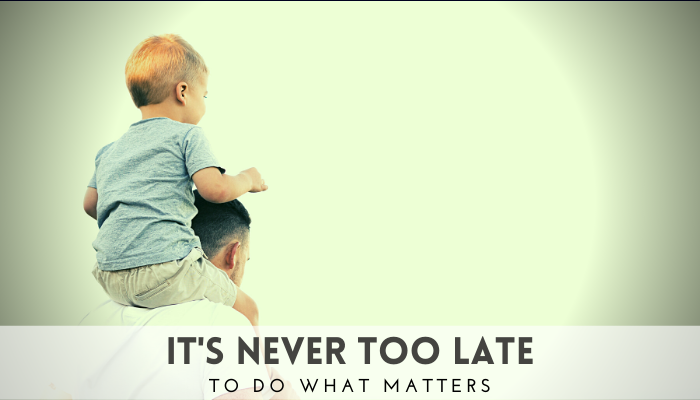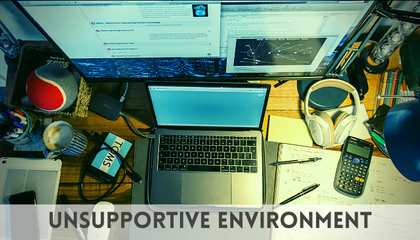|
Do you find yourself pulled between your personal desires or responsibilities and doing what needs to be done for your business or career? In the early 2000’s while managing over one hundred and fifty staff spread across more than forty-one thousand square kilometers, (without Zoom or MS Teams) I was introduced to the concept of work life balance, and I began instilling the idea with the team. It sounded like a great theory at the time, especially with early mornings and late evenings after driving from location to location to visit team members. But with hindsight and knowledge backed by personal experience I came to understand that to obtain true work life balance, a 50/50 split, was not only impossible but trying to achieve it was creating unnecessary stress… kinda defeating the purpose. In the world we woke up in today, things are vastly different than twenty years ago, we can access work from personal devices, and connect with team members across multiple time-zones with the click of a mouse and more of us are choosing to work from home making it so much easier for our focus to be hijacked by less important and often trivial distractions. This can have a detrimental flow on effect on our productivity, relationships and performance as we unconsciously relegate the things that matter the most to the ‘I’ll get to that later’ list. In the leadership programs we run, there is a fun and often tormenting activity we do where participants are forced to let go of the things they believe are important to them in order to get to what really matters most… One by one we witness managers and leaders letting go of their gym memberships, their barista brewed coffee, their nightly glass of wine, their entertainment subscriptions, their hobbies, and even personal freedom is sacrificed as they narrow down to the one thing that matters most to them. Do you know what 98% of participants declare as their most important thing, what they couldn’t live without? It’s Family! If you find yourself doing things that are not important, or chipping away at outdated processes, maintaining unproductive habits that take you further and further away from what matters most to you or heck, you may still be trying to achieve the impossible 50/50 work life balance, you know, feeling guilty at home on the days when work needs to be a priority and thinking you’re in the wrong, or your reputation will be ruined, when personal and family commitments impact your work. It doesn’t have to be this way, you can equip yourself with cutting edge tools to help you navigate the demands of the day, increase productivity, and focus on what matters. I know it can be painful doing things that are not working for us and at the same time not having the knowledge to push back confidently and intelligently on the things that negatively impact our well-being, relationships, goals, values, and time. Before learning or sharpening the tools that will help you do more of what matters… you may want to first understand the 6 most widely experienced derailers I see people from all walks of life struggle with. After 20+ years of diving into the fields of human potential, mindset and neurobiology and psychology combined with 1000’s of hours coaching I noticed common traps we all unwittingly fall into when it comes to getting to the things we really want to do or spending time with the people that matter most. If you are like me and want good results, I have no doubt that you know that to achieve results and perform at our best we need to be confident in our decisions, efficient in our thinking and productive with our time. This is easier said than done because no matter how hard we try to be productive and do what matters, there always seems to be people, situations, notifications, and that pesky inner voice that have the potential to distract and derail us. Derailer #1 - The People Pleaser What I have noticed both within myself in the past, and with coaching clients is the first issue we face. To put it simply, we want to please everyone. Being a people pleaser and not being able to say no effectively leads to doing things not aligned to our goals or doing things to keep other people happy or maintain an unhealthy peace. Derailer #2 - Wired to Avoid Change The second derailer comes from our neurobiology - we are wired to avoid uncertainty. This innate need to feel safe can slow down or even prevent decisions from being made. This leads to procrastination because we’re afraid to make a start or do things differently. We end up fighting against anything that takes us away from homeostasis, clinging to how things are or how things were, wired to stay in the safety of an outdated way of being. Derailer #3 - Unhealthy Habits We can look to biology to understand the third derailer. Derailer number three is our unhealthy well-being habits draining us of the energy we need to get things done. Our energy is derived from the type of food we eat, how much we move, and the quality of our sleep. These are all important factors that impact energy levels and our ability to do what matters, often giving preference to an easy task (think Netflix, gossiping or social scrolling) to match our low energy levels. Derailer #4 - Misaligned Identity The fourth derailer is a psychological one. When our subconscious identity is not aligned to the work we need to do we will unconsciously sabotage our efforts. When who we assume and believe we are is not aligned to who we need to be to get the work done we end up going in circles often reverting to our old ways. If you want to dive a little deeper into the power of your self-image, grab copies of Gay Hendricks book ‘The Big Leap', Chip and Dan heaths Book 'Switch' or Maxwell Maltz book ‘Psycho Cybernetics’. The deeply held beliefs you hold about yourself create a protective system that can sometimes lead to us sabotaging our efforts to focus on what really matters. Derailer #5 - Unsupportive Environment The fifth derailer is an environmental one. You can't be productive if your physical, social, or mental environments are unsupportive. To set yourself up for success in this area be sure to create an uncluttered space dedicated to the work that needs to be done. Ensure that you are socially supported by engaging in a coach or buddy to cheer you on and hold you accountable to delivering on your objectives. It is equally important that you create a supportive mental environment by choosing narratives that support your outcomes such as telling yourself things like:
In essence you’re giving yourself a pep talk to override any beliefs that suggest you don’t have the time, energy, or capacity. Remember: Your mental attitude will always influence you output. Derailer #6 - Distractions And sixth most common thing that derails us is distractions, and wow… the world certainly has turned up the volume on distractions and shiny objects, stealing our attention away from what’s important. Distractions big or small such as noise, notifications, interruptions from other people or pets, regularly checking emails or your phone. Anything that takes you away from what you are doing are the biggest derailers of productivity. These unwanted intrusions on our time slowly eat away at any hope we may have of consciously integrating our work with our life. Believe it or not distractions are the easiest to fix when you know how to set boundaries for yourself and for others. If you'd like some easy fixes to help you deal with distractions grab yourself a copy of Nir Eyal’s book ‘Indistractible’ Getting Back On Track What’s interesting about these six common derailers is that we can overcome all of them by overcoming the first one. Once we know how to say no in an enlightened way, we begin to help ourselves and others to let go of the things that no longer serve us and to focus on what’s important. We can set boundaries for ourselves to create healthy well-being habits, we can set clear limits and expectations as to the person that we want to become, we can say no to the things in our environment that get in the way of our best performance, and we can deliberately put measures in place to ensure we are not distracted from what matters most moment to moment. It’s up to you to get yourself on track and more importantly, stay there. The tools are available in books, podcasts, and courses. The first step is to determine what really matters to you, what’s your priority in any given moment then check to see which of the derailers are present. We know that knowledge alone doesn’t do a darn thing, so if you want support to kick any of your bad habits, outdated self-beliefs or fixed mindset to the curb… I’m opening up my diary to 6 people who are yet to experience Blue Chip Minds Coaching and who want to get back on track to join me for some complimentary 1:1 time in a 30min get me back on track session. So… what stops you most often?
Drop me a line, I’d love to hear what derails you and how you plan to get back on track. Here’s to you doing more of what matters. Contributed by Georgia Ellis Contributor: Georgia Ellis Back in 2013 after leaving my Senior Manager Role behind and stepping into a new version of myself as a Business Owner, I took a trip to Iceland. The icy and snowy landscape was not only epic, but it also provided a timely reminder of the cortical landscape of our brains. Kinda a weird connection to make, but stay with me...
As I took in the landscape I couldn't help but see a resemblance to a Human brain and the way our continual thinking carves out new and unique neural pathways, it occurred to me that as en employee I had been thinking a certain way, which had led me to have a rather successful career... but that thinking, and those neural pathways, were not going to serve me as a business owner. Fast forward to 2019, and with a deeper understanding of neurobiology and the interconnection of our thoughts, emotions and movement. I now appreciate the power of post conventional and complex thinking and the importance or rewiring our brain to steer us in a new direction... partly because of the science, and partly because it's exactly what I did to grow my business. I worked on my mindset first. In the book "The Biology of Belief" by Dr. Bruce Lipton, he explains how our thoughts and beliefs impact our biology. Did you know if you continuously think thoughts with a negative bias about life or the future, that is tell yourself woeful stories or make negative judgements of a situation or person, that you create a neural pathway in your Brain that hooks you up to seeing only the negative? Just like crevices in the snow that have been carved out by a sled taking the same path over time, those continual thoughts create a deep seeded negative bias. When you begin to understand neurobiology and neuroscience and even epigentics, you quickly discover that we can retrain our brains to “steer our sled” on to a new path with a positive outlook, then that pathway will show a physical change in our brains. Neuroplasticity means that our brains are continually firing and wiring new pathways, the more we think a thought, the stronger the connection or pathway, the less we think a thought, the weaker the pathway and eventually it prunes away. Each one of our thoughts and subsequent behaviors are responsible for this change in our brains. It's an empowering idea that we can literally begin to prepare ourselves for these extraordinary, complex and uncertain times with the nature of our thoughts. Not only does a switch in thinking help prepare us for the future, it has other profound effects on us physically and can even help reverse anxiety and depression. Research has shown that regular positive pole thinking can lead to:
Unfortunately negative pole thinking produces the opposite results. Take the point above about being more attractive to other people, I most certainly are turned off by negative people. The best thing about being in control of our thoughts is that we have a new opportunity each moment to enhance our emotional experience. I discovered many years ago that we always have a choice as to how we respond to situations, events and people. Armed with the knowledge that a positive attitude to life is worth nurturing, and that we can steer ourselves onto a different pathway on our habitual cortical landscape, then we can begin to work on strategies to make this happen for ourselves. Some strategies that I have found helpful for steering my thinking into a better future are:
The more I adopted these practices the easier it was to have a positive mindset. My cortical landscape was changing, and i began to naturally steer myself in a positive direction. Changing the way I thought about things, changed the emotional attachment i had with people and situations. I moved from being the victim to the external world to being the master of my inner world, which strangely, changed the way I saw the external events that used to trigger mental anguish. People who know me somehow think I have always had a positive outlook, the truth is I haven't, I had to teach myself and I am still a work in progress, with the know-how and tools to steer my thinking back on track towards an extraordinary future. |
Authors
Our Contributors are a mix of passionate and switched on Humans ready to share their, career, business, well-being, leadership and performance insights with you so you can be the architect of your own extraordinary future! Archives
May 2024
Categories
All
|
Global professional development solutions for individuals and organisations.
Working with Individuals and organisations in;
Australia | Singapore | Hong Kong | United States | India | United Kingdom | Dubai | China | Poland
Malaysia | New Zealand | Japan | Belgium | Austria | South Africa | Brazil | Canada
Working with Individuals and organisations in;
Australia | Singapore | Hong Kong | United States | India | United Kingdom | Dubai | China | Poland
Malaysia | New Zealand | Japan | Belgium | Austria | South Africa | Brazil | Canada
|
We acknowledge the Traditional Custodians of the land on which we live, work, meet and play. This most often is the Wurundjeri people. We pay our respects to Elders past, present and emerging of the Kulin Nation. We extend gratitude and respect to Aboriginal and Torres Strait Islander peoples and global indigenous cultures for their incredible wisdom, resilience, deep connection to the natural environment and their deeply transformative spiritual practices.
We have so much more to learn from you. |
Copyright © All Rights Reserved BLUE CHIP MINDS 2013 - 2021









 RSS Feed
RSS Feed
